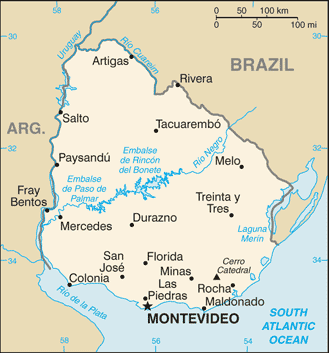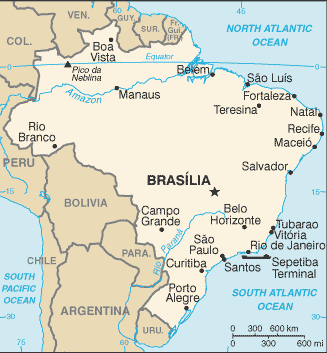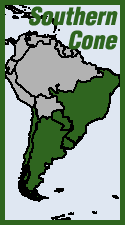 Authorities in Uruguay on May 2 released details on how cannabis will be produced and legally sold in the country, following President José Mujica's bold legalization initiative that passed in December. With the announced regulations, Uruguay becomes the first country in the world to have a system to oversee legal cannabis production, sale and consumption. Licensed pharmacies will sell the herb for less than $1 (up to 22 pesos, or $0.95) a gram, with consumers allowed up to 40 grams (1.4 oz.) a month, or 10 grams per week. Private households may grow up to six cannabis plants. While the new regs are to officially take effect this week, it will be several months before the full system is in place. Diego Canepa, chief of Uruguay's National Drug Junta (JND), said: "Towards the end of November, early December, the sale of marijuana will already be available in the country through pharmacies." He added that the government will launch the licensing process for companies seeking to cultivate cannabis within the next 15 days. The government estimates Uruguay's current cannabis demand at between 18 and 22 tons per year, which would mean approximately 10 hectares of plantations. An Institute for the Regulation and Control of Cannabis (IRCCA) has been established to maintain standards for quality. Use of the herb will be allowed in most public spaces where tobacco smoking is permitted, althought not at workplaces. Motorists caught "smoke-driving" will be subject to the same penalties as those under the influence of alcohol. To discourage "marijuana tourism," only Uruguayan citizens and residents will be allowed to purchase cannabis. (Al Jazeera, AFP, La Nacion, Argentina, RTVE.es, May 3; BBC News, TeleSur, May 2)
Authorities in Uruguay on May 2 released details on how cannabis will be produced and legally sold in the country, following President José Mujica's bold legalization initiative that passed in December. With the announced regulations, Uruguay becomes the first country in the world to have a system to oversee legal cannabis production, sale and consumption. Licensed pharmacies will sell the herb for less than $1 (up to 22 pesos, or $0.95) a gram, with consumers allowed up to 40 grams (1.4 oz.) a month, or 10 grams per week. Private households may grow up to six cannabis plants. While the new regs are to officially take effect this week, it will be several months before the full system is in place. Diego Canepa, chief of Uruguay's National Drug Junta (JND), said: "Towards the end of November, early December, the sale of marijuana will already be available in the country through pharmacies." He added that the government will launch the licensing process for companies seeking to cultivate cannabis within the next 15 days. The government estimates Uruguay's current cannabis demand at between 18 and 22 tons per year, which would mean approximately 10 hectares of plantations. An Institute for the Regulation and Control of Cannabis (IRCCA) has been established to maintain standards for quality. Use of the herb will be allowed in most public spaces where tobacco smoking is permitted, althought not at workplaces. Motorists caught "smoke-driving" will be subject to the same penalties as those under the influence of alcohol. To discourage "marijuana tourism," only Uruguayan citizens and residents will be allowed to purchase cannabis. (Al Jazeera, AFP, La Nacion, Argentina, RTVE.es, May 3; BBC News, TeleSur, May 2)
 Amnesty International in a report issued Aug. 3 charges that Brazil's military police have been responsible for more than 1,500 deaths in Rio de Janeiro in the last five years, accusinf them of a "shoot first, ask questions later" policy. Amnesty released the findings ahead of the one-year countdown to the 2016 Rio Olympic Games. The report, "You killed my son: Killings by military police in Rio de Janeiro," reveals that nearly 16% of the total homicides registered in the city in the last five years took place at the hands of on-duty police—1,519 in total. Just in the favela of Acari, in the city's north, Amnesty found evidence of "extrajudicial executions" in at least nine out of 10 killings committed by the military police in 2014.
Amnesty International in a report issued Aug. 3 charges that Brazil's military police have been responsible for more than 1,500 deaths in Rio de Janeiro in the last five years, accusinf them of a "shoot first, ask questions later" policy. Amnesty released the findings ahead of the one-year countdown to the 2016 Rio Olympic Games. The report, "You killed my son: Killings by military police in Rio de Janeiro," reveals that nearly 16% of the total homicides registered in the city in the last five years took place at the hands of on-duty police—1,519 in total. Just in the favela of Acari, in the city's north, Amnesty found evidence of "extrajudicial executions" in at least nine out of 10 killings committed by the military police in 2014. 
 Cheers broke out in the public gallery July 7 as Chile's lower-house
Cheers broke out in the public gallery July 7 as Chile's lower-house  Uruguay started registering cannabis growers' clubs at the end of October. Under the plan, licensed clubs of up to 45 members will be allowed to grow a maximum of 99 plants annually, with each club member permitted to produce up to 480 grams per year. This is an advance on the regulation approved in August, allowing personal cultivation of up to six plants. (
Uruguay started registering cannabis growers' clubs at the end of October. Under the plan, licensed clubs of up to 45 members will be allowed to grow a maximum of 99 plants annually, with each club member permitted to produce up to 480 grams per year. This is an advance on the regulation approved in August, allowing personal cultivation of up to six plants. (





Recent comments
1 week 4 days ago
1 week 4 days ago
4 weeks 5 days ago
5 weeks 4 days ago
9 weeks 5 days ago
13 weeks 3 days ago
17 weeks 3 days ago
18 weeks 2 days ago
28 weeks 2 days ago
32 weeks 2 days ago